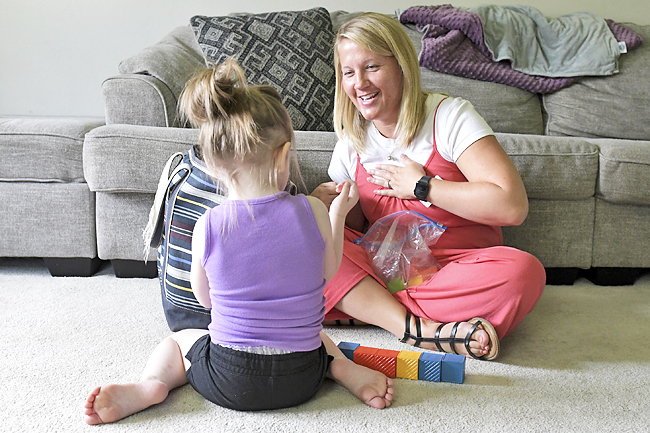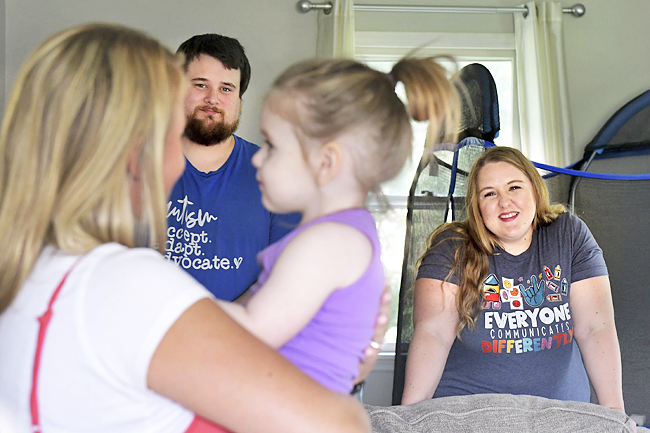CHICAGO (AP) – Alexander watches Paw Patrol with fervour, bowls his baby brother over with hugs and does everything with gusto.
What the three-year-old West Chicago toddler can’t do yet is speak more than a few words. His balance is wobbly and he isn’t able to let his preschool teachers know when he’s hurt or scared.
When his mother, Hilda Garcia, had him tested, the youngster qualified for five therapies through a United States (US) programme dedicated to treating developmental delays in babies and toddlers – treatment designed to help Alexander develop the tools he needs to thrive.
The relief she felt in identifying what he needed was short-lived.
The federally mandated Early Intervention programme is plagued by chronic staffing shortages nationwide, leaving thousands of desperate parents frustrated: They know their children need support, they’re aware of proven therapies that could make a difference, but they have to wait for months to get the help they need.
After 14 months of phone calls, hours of research and pushing herself to the limit with work and childcare, Garcia finally landed an in-person early intervention appointment, but even then she couldn’t get Alexander all the therapies he needed. She tears up as she recounts how overwhelming the fight to secure access has been.
“I didn’t have any support,” she said.



‘THE EARLIER, THE BETTER’
Early Intervention was created in 1986 to address developmental delays in children like Alexander as soon as possible. About one in six children in the US has at least one developmental disability or other developmental delay, according to the US Centers for Disease Control and Prevention.
Since all US states and territories accept federal funding for Early Intervention, they are obligated to provide services to kids who qualify under the Individuals with Disabilities Education Act.
But providers are scarce in almost all states. Some children wait months or years for the care they need, and many age out of the program before they access any services at all.
The COVID-19 pandemic worsened chronic staffing shortages, in part because many providers didn’t want to risk infection by entering families’ homes, even when restrictions on in-person visits were lifted, according to executive director Maureen Greer of the Infant and Toddler Coordinators Association, which supports the Early Intervention system nationwide.
For similar reasons, families were also less likely to request in-person help during the pandemic. But now the number of children seeking services has rebounded, and states are struggling to find the staff to meet the needs of families with young children with disabilities, according to Katy Neas of the US Department of Education.
Service delays in Illinois, where Alexander lives, nearly doubled in 2022, according to Chicago-based early childhood advocacy organisation Start Early. Waitlists – technically not allowed since all eligible kids are entitled to Early Intervention – have increased dramatically and thousands of providers have left the field, according to the Illinois Department of Human Services.
When children turn three, the responsibility for providing special education services shifts from Early Intervention to school districts. But those systems are understaffed and booked up, too, according to speech-language pathologist Sarah Ziemba, an Early Intervention provider in Peoria, Illinois.
Waiting means skipping precious months of development, while acting early saves money on special education and other services later in life.
“Research really supports that the earlier, the better. And so when we miss those opportunities to help them at those younger ages, sometimes we are limiting their potential into adulthood,” said Ziemba.
Families with private insurance can opt to pay for therapy appointments outside the Early Intervention programme, but those without the means can be left behind, according to Ziemba.
“In a way, Early Intervention is contributing to some social inequity,” she explained.
Research supports her assessment. A report published this year by the National Institute for Early Education Research found that Asian, Hispanic and Black children are less likely to receive Early Intervention and Early Childhood Special Education services than white non-Hispanic children.
“For Black children, the disparities in access to services are especially large and cannot plausibly be explained by differences in need,” the report says.
Income also plays a role, said lead researcher Allison Friedman-Krauss. “Poorer states are serving a lower percentage of children, so really suggesting that there is a problem there,” Friedman-Krauss said.
But there is no way to attract more providers without better wages, Ziemba explained. Early Intervention providers in Illinois are government contractors, meaning they get no health benefits or paid time off, and they can effectively double their salaries by working in other settings such as hospitals, schools or nursing homes.
“People are just done with it, and it has gotten worse even in the last two months,” Ziemba said in late July. “I really feel like we’re kind of seeing the implosion of the whole programme.”
As families lose access to the free or reduced-cost therapies, pressure builds on schools to pick up the slack, but they’re short on special education teachers, too.
“In the long term, we’re seeing kids fall farther and farther behind,” said Ziemba, who has done this work for nearly 25 years.
Illinois Governor JB Pritzker signed a budget in June giving Early Intervention providers a 10 per cent raise. That helps, Ziemba said, but likely won’t make up for the impact of inflation and may not be enough to slow the steady exodus of workers. She and another provider say wages were stagnant for years.
In July, the administration announced a retention programme designed to reward tenured Early Intervention providers, interpreters and service coordinators with payments of up to USD1,300 to stay in the field.
“We remain committed to giving our service providers the support and resources they deserve for caring for our state’s children,” said spokesperson Alex Gough for the governor’s office.
The impact therapy can have is palpable. Lindsey Faulkner, a mother of four living in Peoria, got in-person speech therapy sessions for her two-year-old daughter, Aria, within a month of her referral. She raves about the difference she has seen in her child after a year of working with therapist Megan Sanders.
“She was an entirely different kid a year ago,” Faulkner said.
Early on in their sessions, Aria zoomed around the room. Now, Aria can sit and engage with Sanders for most of the session. She looks Sanders in the eye more often, responds to her gentle guidance and is starting to use sign language.
“We’ve come a long way,” Sanders said. “My goal throughout is just to make her more able to express herself.”
When Aria was about a year old, Faulkner noticed that words the toddler had been using started to disappear. “She began screeching for everything that she wanted rather than asking us for help or gesturing.”
Aria qualified for speech, developmental and occupational therapy, and was diagnosed with autism when Faulkner was finally able to secure an appointment with a developmental pediatrician, two and a half hours away in St Louis. Although Aria started speech therapy promptly, she has been on the waitlist for developmental therapy for more than a year.
Faulkner was “floored” when she learned about the wait times.
“You need to get answers for your child,” she said. “But here, now you have to sit and wait.” Early Intervention providers and service coordinators, who connect families with therapists, are woefully underpaid, according to Darcy Armbruster, a physical therapist who serves DuPage County near Chicago and has worked in the Early Intervention programme for 11 years.
Armbruster said it would make more financial sense for her to quit Early Intervention, but she stays because she loves the relationships she builds with families. – Claire Savage



















































